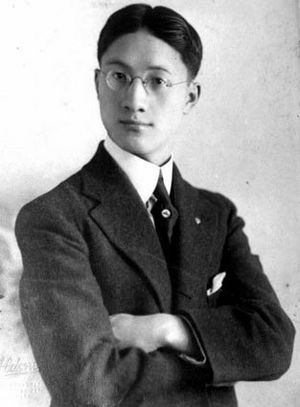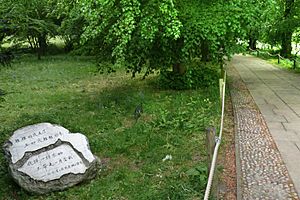Xu Zhimo facts for kids
Quick facts for kids
Xu Zhimo
|
|
|---|---|
 |
|
| Born | 15 January 1897 Haining, Zhejiang, Qing China
|
| Died | 19 November 1931 (aged 34) |
| Alma mater |
|
| Spouse(s) |
|
| Relatives | Jin Yong (cousin) |
Xu Zhimo (徐志摩, born January 15, 1897 – died November 19, 1931) was a famous Chinese poet. He is known as a romantic poet. He wanted to change Chinese poetry. He used ideas from Western poetry and everyday Chinese language. Many people see him as one of the most important people in modern Chinese poetry.
Contents
Xu Zhimo's Life Story
Xu Zhimo had a few names. His most famous name was Xú Zhìmó. He was born as Xú Zhāngxù. His courtesy name was Yǒusēn.
He was born in Haining, Zhejiang, China. He went to Hangzhou High School, a well-known school in Southern China. In 1915, he married Zhang Youyi. The next year, he started studying law at Peiyang University (now Tianjin University). In 1917, he moved to Peking University (PKU). This happened because the law department of Peiyang University joined PKU.
In 1918, Xu Zhimo traveled to the United States. He studied political and social sciences at Clark University in Worcester, Massachusetts. He also studied history. In 1919, he went to Columbia University in New York. There, he studied economics and politics.
He left the U.S. in 1921. He then went to England to study at King's College, Cambridge. In England, he really liked English Romantic poetry. Poets like John Keats and Percy Bysshe Shelley inspired him. He also liked French romantic and symbolist poets. He translated some of their works into Chinese.
In 1922, he came back to China. He became a leader in the modern poetry movement. In 1923, he started the Crescent Moon Society. This was a Chinese literary society. It was part of the bigger New Culture Movement. They believed in "art for art's sake." This meant art should be made for its own beauty, not for politics. They often debated with groups that believed in "art for politics' sake."
When the Bengali poet Rabindranath Tagore visited China, Xu Zhimo helped him. He was one of Tagore's interpreters. Xu Zhimo was also famous for using everyday Chinese language in his poems. He was one of the first Chinese writers to successfully use Western romantic styles in modern Chinese poetry. He worked as an editor and a professor at different schools.
Xu Zhimo's Marriages
Xu Zhimo's personal life is well-known in China. He married Zhang Youyi in 1915. This marriage was arranged by their families. Xu Zhimo did not believe in arranged marriages. He wanted to marry for love. Zhang Youyi had two sons with him.
While he was in London in 1921, Xu Zhimo met Lin Huiyin. He divorced Zhang Youyi in 1922. This new feeling of love inspired him to write many poems. Lin Huiyin and Xu Zhimo became good friends. However, she was already promised to Liang Sicheng by his father.
Xu Zhimo's last wife was Lu Xiaoman. She was married to Wang Geng, who was a friend of Xu. Her parents had also arranged her marriage. She felt unhappy in it. When Xu Zhimo and Lu Xiaoman met, they felt a strong connection. They both understood what it was like to be in an arranged marriage.
When people found out they were in love, their families and friends were upset. Lu Xiaoman divorced her husband in 1925. She married Xu Zhimo the next year. Their happy time together did not last long. Lu Xiaoman became sadder over time. She also spent a lot of money. Xu Zhimo's parents would not give them money. So, Xu Zhimo had to work many jobs in different cities. He did this to support the lifestyle Lu Xiaoman wanted. She became a widow when Xu Zhimo died in a plane crash.
Xu Zhimo's Airplane Crash
On November 19, 1931, Xu Zhimo was going from Nanjing to Beijing. He was going to attend a lecture by Lin Huiyin. He took a China Airways Federal plane. This plane was also used by Chunghwa Post to deliver mail.
When the plane reached the Jinan area, there was thick fog. The pilots could not see clearly to land. The plane flew lower into a mountainous area. The pilots were looking at their map. As the plane tried to turn left, it hit the top of a mountain. The right wing broke off. The plane lost control and crashed into the mountains. This happened near Jinan City and Tai'an City in Shandong province.
Xu Zhimo died instantly from serious head injuries and cuts. One of the two pilots also died right away. The other pilot survived the first crash but died later because rescue was delayed.
Experts said the crash happened because the pilots misjudged how high they were. They also did not see the mountains in time. Some people rumored that Xu Zhimo was murdered, but this was proven to be false.
His Famous Cambridge Poem

Xu Zhimo's most famous poem is Zaibie Kangqiao. This means "Again Leaving Cambridge" or "Saying Goodbye to Cambridge Again."
To remember Xu Zhimo, a white stone was placed at the Backs of King's College, Cambridge in July 2008. This is near the bridge over the River Cam. The stone has lines from his poem.
The English translation of the poem below was done by Guohua Chen. It was published in the University of Cambridge's 800th anniversary book.
|
再别康橋 |
Taking Leave of Cambridge Again |
See also
 In Spanish: Xu Zhimo para niños
In Spanish: Xu Zhimo para niños
 | Aurelia Browder |
 | Nannie Helen Burroughs |
 | Michelle Alexander |

